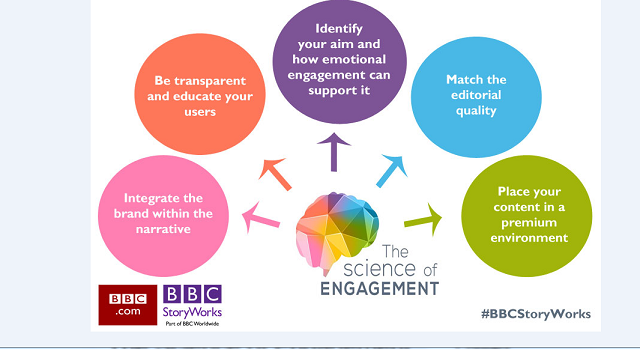 BBC StoryWorks, the content marketing arm of BBC Advertising, is pioneering new ways of understanding the emotional impact of content-led marketing by measuring consumers’ subconscious reaction to campaigns on BBC.com. In a study published today titled ‘The Science of Engagement’, its in-house insight team, in partnership with facial coding experts CrowdEmotion, has combined traditional research metrics with facial coding to understand how brands can use content-led marketing to effectively engage with consumers. BBC Advertising plans to offer this insight to premium clients as part of its campaign reporting to ensure they understand the full impact content-led marketing can have on consumers and the value of it to their brands.
BBC StoryWorks, the content marketing arm of BBC Advertising, is pioneering new ways of understanding the emotional impact of content-led marketing by measuring consumers’ subconscious reaction to campaigns on BBC.com. In a study published today titled ‘The Science of Engagement’, its in-house insight team, in partnership with facial coding experts CrowdEmotion, has combined traditional research metrics with facial coding to understand how brands can use content-led marketing to effectively engage with consumers. BBC Advertising plans to offer this insight to premium clients as part of its campaign reporting to ensure they understand the full impact content-led marketing can have on consumers and the value of it to their brands.
According to the research – the first of its kind by a publisher – well executed and clearly labelled content-led marketing is considered trusted and persuasive in quality environments, and has a powerful emotional impact for the brands involved. Exposure to content-led marketing can significantly improve consumers’ positivity towards the advertising brands (with a +77% increase in explicit positivity between pre and post exposure). In addition, the study measured* the second-by-second facial movements of people as they experienced the content to measure true engagement and the respondents’ implicit reaction. The results showed that exposure can also lead to a 14% increase in subconscious positivity.
Richard Pattinson, SVP Content, BBC Advertising and Head of BBC StoryWorks, said: “In a time when advertisers are increasing their spending on content-led marketing, it is important that they also feel confident in its effectiveness, and understand the significant positive impact this kind of content has on their brand. We believe that this study will enhance advertisers’ understanding and confidence in these campaigns, and in the value of high quality content-marketing delivered in premium environments.”
Other key findings from the research include:
Transparency and quality were revealed to be the most important factors in engaging the audience.
64% were happy to read content-led marketing so long as it is clear which brand it is presented by and 64% were happy to read as long as it is clearly labelled.
Among those who already have a high awareness of the medium, this increases to 82% and 83% respectively. From that group, 80% agreed they would share it and 80% think it plays a complementary role to editorial content.
In the facial coding study, rejection for fully labelled brand-presented content was 7% below the average benchmark, while rejection for non-labelled content was 18% above the average.
63% of respondents were happy to see the content as long as it mirrored the quality of the provider’s editorial content. In addition, 59% found the content informative, 55% found it interesting and 57% said they would share it.
Consumers are 30% more likely to believe content-led marketing on premium news providers will be more informative and accurate than on non-premium news providers.
Content-led marketing enhances brand perceptions, with a +10% uplift for familiarity and a +14% uplift in average brand image between test and control. It also drives brand amplification, with a +14% increase in recommendation and a +16% lift in consideration.
Integrating the brand drives a greater emotional response and referencing the brand within the content narrative works harder for the advertiser. Integrated content drives a +109% increase in explicit and a +32% uplift in implicit brand positivity. Integrated content also increases key call to action measures of recommendation (+21%) and consideration (+20%).
The month-long study was conducted in October 2015, following the insight that while traditional performance metrics offered a partial story of campaign success, combining them with the measurement of both conscious and subconscious consumer reaction to branded content offered a more rounded view of the effectiveness of content-led marketing campaigns.
On the decision to explore emotional recognition techniques, Pattinson commented: “BBC StoryWorks has used the innovative facial coding methods offered by CrowdEmotion to prove that when made transparent and properly executed, brands can use content-marketing to heighten emotional engagement and enhance brand perceptions with consumers.”
The key findings from the BBC StoryWorks study have shown five general principles when it comes to content marketing:
Be transparent and educate your users;
Match the editorial quality;
Be clear what your content is trying to achieve and how emotional engagement can support that;
Integrating the brand within the narrative will work harder for the brand;
Placing in a premium environment will give your content credibility and allow it to flourish.

